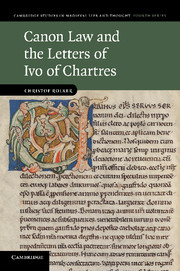Book contents
- Frontmatter
- Contents
- List of abbreviations
- Note on the citation of manuscripts
- 1 IVO OF CHARTRES – ‘LIFE AND LETTERS’?
- 2 CANON LAW BEFORE IVO
- 3 COLLECTIONS KNOWN TO OR COMPILED BY IVO
- 4 THE CANON LAW IN IVO'S CORRESPONDENCE
- 5 HIERARCHIES OF AUTHORITY: IVO's VIEWS ON DIVINE LAW AND THE ECCLESIASTICAL HIERARCHY
- 6 THE LAWS OF MARRIAGE: ‘QUOD ET NATURA DISPOSUIT, ET LEX TAM ECCLESIASTICA QUAM MUNDANA FIRMAVIT’
- 7 IVO'S DECRETUM AND THE PANORMIA: CHARACTER, RECEPTION, AUTHORSHIP
- 8 IVO'S PASTORAL CANON LAW AND HIS PLACE IN LEGAL HISTORY
- Appendix: A concordance table for the quotations in Ivo's letters
- Bibliography
- Index to single letters of Ivo of Chartres
- Manuscript index
- General index
5 - HIERARCHIES OF AUTHORITY: IVO's VIEWS ON DIVINE LAW AND THE ECCLESIASTICAL HIERARCHY
Published online by Cambridge University Press: 04 August 2010
- Frontmatter
- Contents
- List of abbreviations
- Note on the citation of manuscripts
- 1 IVO OF CHARTRES – ‘LIFE AND LETTERS’?
- 2 CANON LAW BEFORE IVO
- 3 COLLECTIONS KNOWN TO OR COMPILED BY IVO
- 4 THE CANON LAW IN IVO'S CORRESPONDENCE
- 5 HIERARCHIES OF AUTHORITY: IVO's VIEWS ON DIVINE LAW AND THE ECCLESIASTICAL HIERARCHY
- 6 THE LAWS OF MARRIAGE: ‘QUOD ET NATURA DISPOSUIT, ET LEX TAM ECCLESIASTICA QUAM MUNDANA FIRMAVIT’
- 7 IVO'S DECRETUM AND THE PANORMIA: CHARACTER, RECEPTION, AUTHORSHIP
- 8 IVO'S PASTORAL CANON LAW AND HIS PLACE IN LEGAL HISTORY
- Appendix: A concordance table for the quotations in Ivo's letters
- Bibliography
- Index to single letters of Ivo of Chartres
- Manuscript index
- General index
Summary
INTRODUCTION
The study of the textual relation between Ivo's correspondence and the Ivonian collections reveals something about the formal sources by which canon law was known to Ivo, and shows with which sources he became familiar in the course of time. The question remains of how he dealt with these authorities. How did he understand the law, what were his preoccupations with canon law, and which views did Ivo hold on different questions? Two preparatory considerations seem necessary before addressing these questions. First, if the following chapter is devoted to Ivo's understanding of ‘canon law’, one has constantly to bear in mind that ‘the law’ had a very broad meaning in Ivo's time. Ivo's Decretum and his letters remind one that there was no clear distinction between theology and law. Canon law included many areas which are theological as well as legal in character, e.g. marriage and penance, and some issues which modern readers would often not see as legal at all, e.g. the understanding of the Eucharist. And of course even ‘canon law’ in the narrow sense is based on biblical precepts, patristic theology and certain exegetical traditions as well as ‘proper’ legal sources such as secular legislation, synodal decrees and papal decretals. The second caveat concerns the sources for Ivo's thought. Given that Ivo's acknowledged works are so extensive, and that several more have been attributed to him, the question of how to select one's sources demands some thought.
- Type
- Chapter
- Information
- Canon Law and the Letters of Ivo of Chartres , pp. 163 - 210Publisher: Cambridge University PressPrint publication year: 2010



